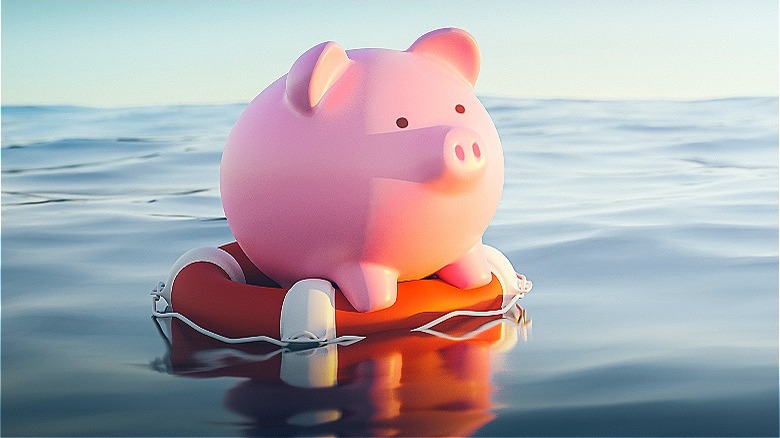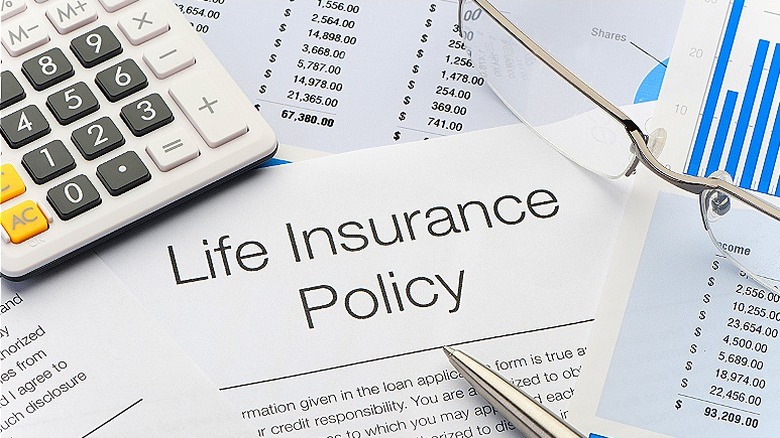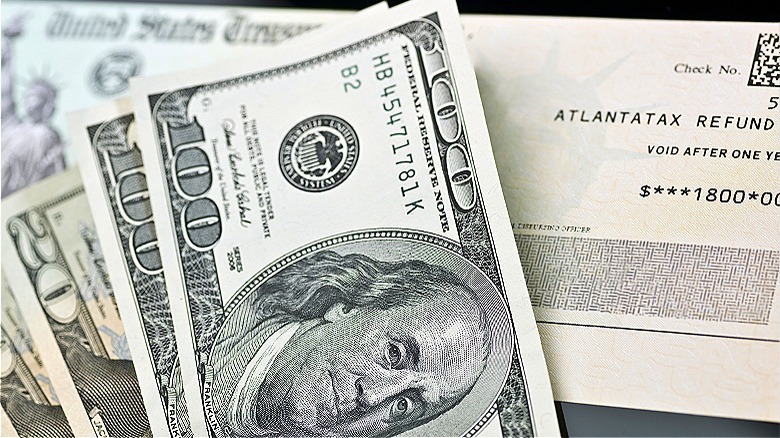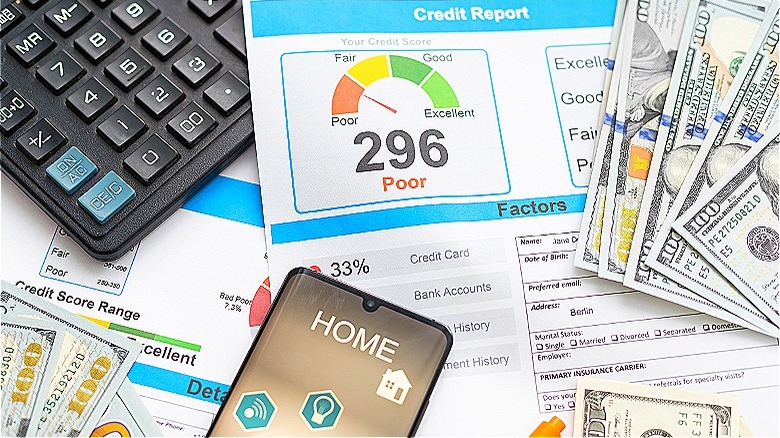13 Common Financial Mistakes You're Probably Making Right Now
Managing money is hard. Keeping up with a mortgage or rent, credit card bills, and the essential entertainment spending category in your budget can lead to some creativity that results in less than positive outcomes over the long term. Whether obvious or not, there are quite a few common mistakes people often make with their finances that result in Increasing fiscal strain and a bevy of headaches that will have to be dealt with later.
Issues like failing to budget altogether are obvious, and yet a 2020 survey by Intuit found that 65% of Americans didn't know how much they spent in the previous month. Building a budget is the first tangible step toward any kind of financial stability and strength. Understanding your incoming and outgoing flow of capital allows you to make smarter financial decisions both in the here and now and in long-term planning.
This is the first mistake you may be making today; fortunately creating a budget is something that can be done without any prerequisites. However, there are many other common financial mistakes, both large and small, that may factor into your daily life. Once you've established your budget, it's time to start tackling some of these other problem areas and oversights.
1. Relying too heavily on credit cards
Credit cards can be an excellent financial tool. For one thing, if you intend to buy a house in the future, then intelligent credit card use is an absolute must. Building up good credit allows for improved interest rate opportunities and an expanded menu of lenders that will be willing to work with you when the time comes to pull the trigger on that new home. The same goes for the purchase of a car, financing appliances or furniture, or taking out a personal loan. Good credit starts with smart credit card management. However, many Americans rely too heavily on their credit cards.
Using a card for the bulk of monthly purchases can allow for complacency in spending habits. It's easy to forget how much you've already spent, or to simply swipe the card on one too many splurge purchases. The most important thing any credit card user can remember is to treat the line of credit as if it were cash. You can't overspend if you use only cash. The budget is finite, and when resources run out, the spending stops.
In short, overreliance on a credit card can result in spending more money than is available. If this becomes a habit, not only can it drag down your credit score, but the added interest charges on carried balances can make those simple purchases far more expensive when it comes time to pay them back.
2. Thinking all credit are created equal
Another common mistake regarding credit occurs when users fail to recognize the differences inherent in individual types of credit. Credit cards and other short-term lending products are marked by the highest interest rates on the market. Borrowers may not always have the option to use various types of credit for their spending needs, but when it comes to repaying debts, there's a distinct strategy that should be employed. Paying off high-interest balances first will help you save a substantial amount of money in the long run. This means paying back credit cards and personal loans before committing additional dollars to mortgages, car loans, and other long-term credit lines that benefit from lower interest rates.
While short-term repayment options often feel like a great bargain in real time, using them should be done sparingly because of the higher cost of borrowing that comes along with these conveniences. As with many other features of the financial marketplace, relying too heavily on short-term repayment solutions easily translates into over-extension that can put even the most diligent budgeter in a hole that's hard to dig out of.
3. Buying a brand new car
A car purchase is a big deal. Whether you're investing in your first vehicle or replacing an ageing one, the choice seems limitless as you explore models on the market. A car offers increased opportunity for a variety of reasons. Selection of jobs and places to live becomes more abundant, and personal transportation improves leisure opportunities, too. Car buyers can easily fall into the trap of buying a new car model, however. A new car comes along with a flashy exterior and some of the best amenities around. But new cars are substantially more expensive, contributing to one of the most common financial mistakes you can make.
Experts suggest the purchase of a new car shouldn't exceed 10% of your gross income for the year (via CNBC). This is because the price tag is only one aspect of a car's overall cost. Yearly maintenance, taxes and registration, gasoline, and, of course, the interest you'll pay if you're financing the vehicle, all come together to inflate the cost of car ownership.
The average annual salary in 2023 is just under $60,000, per Forbes Advisor, meaning the average car purchase should come in at around $6,000, according to this mindset. While the glitziest ride around might not be in the cards with this kind of budget, a dealer-certified preowned vehicle often comes with warranty coverage and many great years still ahead. An emotional car purchase is a surefire way to dig a financial hole. Stay grounded with this critical expense for the bet in continuing budget stability.
4. Not having an emergency savings pool
Cash savings will almost certainly earn less than other investment options that are notably less liquid. Stocks, bonds, and even other investment assets like cryptocurrencies or bullion might be more favorable long-term investment opportunities, but cash savings are a must as well, even though it might feel like a waste of earning potential. Emergency savings, in particular, is something that virtually every money expert on the planet recommends right off the bat.
Emergency savings acts as a lifeline to support for you and your loved ones in the event of an unforeseen circumstance. This might be sudden spending requirements to recover from a natural disaster, or the buffer your family demands if you lose your job without warning. Keeping at least three months of expenses in an easily accessible cash savings pool offers the peace of mind people across all walks of life need when the road ahead gets tougher.
Of course, this is another one of those financial tidbits that's easier said than done, as 22% of Americans have no emergency savings at all, according to Bankrate's 2023 annual report on emergency savings. While times are good, it's important to prioritize creating a cash reserve that will see you through leaner days. It won't happen overnight, but diverting some of your other nonessential spending — or even dipping into the funds from an aggressive investment strategy — to build this buoy will serve you tremendously well.
5. Ignoring the importance of life insurance
Much like emergency savings, life insurance is a defensive financial posture you hope to never need. Yet, for the same reason people lock their front doors, they also buy car insurance, invest in emergency savings, and take out life insurance policies. When the need arises to protect your loved ones, life insurance will step in to provide for them.
Life insurance payouts are often structured to cover the remainder of a mortgage, replace lost income, or even cover educational expenses. When considering a life insurance plan, you'll want to think about all the things your spouse or children rely on your income to provide. Losing one or both of the home's incoming cash flow can be devastating, but life insurance coverage is designed to take over where income leaves off. When new people come into your life, a life insurance policy becomes a necessary protection to ensure that having to mourn your loss doesn't devolve into a far more desperate situation.
6. Overspending on your home
Whether you rent or own your home, spending too much on housing creates a cost that's more or less locked in for long durations (either with a tenancy agreement or a mortgage). These costs are unavoidable, but overspending on this category can sink an otherwise healthy budget. Experts, like Ramsey, suggest spending no more than 25% of your take-home pay on housing for this very reason.
The larger your home's share of the pie is, the less money you'll have available for other spending needs. These often include money needed for food and transportation, but if housing costs balloon too much, they could eat into savings or entertainment spending as well. For a select few, the amenities and intangibles of one home over another might warrant a bit of overreach here — for instance in purchasing a home with a pool for those who know they will use it religiously. However, the vast majority of consumers will be cutting into other spending categories that won't be easily reconfigured by overspending on housing costs.
Similarly, whether you're renting or buying, opting for a property that has more rooms than you actually need is a common financial mistake and a great way to introduce other costs into the mix that could be avoided altogether. A single person living in a three-bedroom home will be heating or cooling the entire space, even if one room sits completely idle. Choosing a home that's right for your lifestyle and budget will help stabilize many other facets of your fiscal balance.
7. Making purchases based on price rather than quality
Many financial mistakes consumers run into on a regular basis involve overspending on things that don't make sense financially. This mistake is actually marked by the opposite phenomenon. All too often, people focus all their attention on the price tag when comparing phones, clothing, and many other consumer goods. A direct price comparison can be a great way to decipher certain aspects of value when considering a new TV or car, but it's not the only mark of a good deal. In fact, a cheaper smartphone or pair of jeans may actually signal a weaker build quality or standard of production. The lower price tag might offer nice savings in the short term, but a higher quality item may last twice as long on your shelf, in your cupboard, or on the driveway.
The resulting longevity equates to a better bargain in many instances, even with a higher upfront cost. Price should always be a strong factor when considering any new purchase, but build quality, customer feedback, warranty options, and many other considerations all combine to create a complete picture when comparison shopping. Failing to take these other factors into account is an easy way to end up spending more money over the long term when cheap purchases inevitably break or fail and require replacement.
8. Holding onto unused subscriptions
From gym memberships to streaming services, subscriptions come in all shapes and sizes, and they're often underutilized. Shedding some or all of these unused drains on your finances can make a big difference in both monthly cash flow and overall financial stability on a longer timeline. Keeping an eye on the subscription services you maintain is a good practice to get in the habit of upholding. It'll allow you to become a better steward of your finances and help you spend your money on things that will enrich your life while understanding the kinds of subscriptions and other purchases that won't end up being used or add value to your lifestyle.
Fortunately, canceling subscriptions is one of the easiest fixes when it comes to these common financial mistakes Americans often find themselves making. Unlike the long-term commitment that establishing an emergency fund or paying off high-interest credit card debt requires, saving money by eliminating unused services just takes a few minutes of your time. Moreover, eliminating these payments will make an immediate impact.
9. Forgetting about retirement investments
Retirement is something Americans will increasingly have to afford with supplements from their own savings and investments. Pension plans and even the Social Security program designed to help people enjoy life after work are continuing to weaken over time, and personal savings will have to come into the picture in some way or another for essentially every American with designs on leaving the workforce for good. However, the loose timeline that connects the now of working life with the then of retirement is marked by many decades. This allows savers to get a little complacent when it comes to thinking about their retirement investments. It's easy to put off saving for retirement when the end goal is 30 or 40 years down the road, but if you wait too long, you'll arrive at that day without ever starting your financial planning.
According to a 2023 Bankrate survey, 56% of Americans are behind when it comes to retirement savings, but the reality is that being behind isn't the death knell that it might seem. As you continue to progress through your professional environment, you're likely to continue seeing promotions and raises, leading to as much as 50% more earning potential in your 40s than in your early 20s. The result is a much greater potential to save as you continue to progress toward those golden years.
10. Failing to take advantage of investment matching offers
Another feature of the retirement landscape many Americans fail to take advantage of is 401K matching plans that their employers might offer. These aren't going to act as a game-changer within your savings portfolio all on their own. But the added capital will certainly make a noticeable difference if you utilize it year after year.
So many people wait to start investing in their future, but while they stand at the starting line, they're also missing out on free matching contribution opportunities from their workplace. You might only be able to add a matched value of a few percentage points or even a dollar amount, but if you can add an extra $500 or $1,000 to your retirement portfolio for free every year and don't, you're leaving money on the table that would be working hard for you over the long term.
While 401K matching programs are a great benefit for employees, an estimated 41% of Americans who could utilize this free cash infusion don't, according to CNBC's Your Money Survey. This is an easy financial mistake to make, but a truly costly one when you add up all the free additions to your retirement account.
11. Using tax refund checks as a splurge fund
The average tax refund in 2023 was $2,753. While slightly lower than the previous year, these checks are still large enough to fund a quality vacation or make a good dent in the purchase of a new car, boat, or home renovation. These kinds of splurges are common among Americans after the tax man sends back overpaid capital to American workers. But spending this check on something new and exciting is a financial mistake that's all too easy to fall victim to.
Your tax refund check is a return of money that you overpaid to the government. It's not free cash. Rather, this money should be treated as a kind of savings scheme. The federal government withholds the money to cover your tax bill and then returns any overcharged amount to you once a year. The cash that comes back is enough to pay for something nice for yourself, but it's also equally valuable for more practical investments, like paying down high-interest credit card bills, adding to retirement savings, or pushing directly into an emergency savings fund.
This isn't to say you should never splurge, or even that buying something nice for yourself or your loved ones isn't a worthwhile use of this money, in particular. This refund check can serve more than one purpose, but if you're already working against the tide of a hefty savings goal or striving to eliminate debts, this cash infusion can go a long way toward greater financial stability.
12. Succumbing to 'lifestyle creep'
Lifestyle creep is a real threat to financial well-being that all too many people experience as they continue to progress through their work and social lives. Over time, nearly everyone aspires to earn promotions, raises, and even completely new job opportunities that make work more enjoyable and offer better salaries. For many, the accumulation of experience and contacts within their industry can often make continuous improvements to financial circumstances a reality.
But when a new raise comes along or even a change of company that brings about a sizable salary boost, it's crucially important to keep everything in perspective. Lifestyle creep is the tendency to start spending extravagantly when circumstances change for the better. This means buying more expensive clothing or splurging on fancier personal items more often.
In truth, there's nothing wrong with getting yourself or your loved ones something nice when things change and you can afford it. But the reality of modern life is that there will always be ups and downs, so when financial success becomes more abundant, the first thing anyone should do is pay themselves. Increasing savings is the best way to plan for a rainy day, and when a raise comes your way, the additional cash coming in makes for the perfect opportunity to reevaluate your savings strategies and goals. This new infusion hasn't been accounted for in any of your existing spending, so putting some — or even most — of it toward increased retirement or emergency fund savings is a simple and highly beneficial practice.
13. Not monitoring credit reports from the three bureaus
One thing far too few Americans understand is that they can request their credit reports from each of the three reporting bureaus. A free report is available once per year from each company: Experian, TransUnion, and Equifax. Requesting updated credit reports on a regular basis gives you the opportunity to keep tabs on any potential fraudulent activity or identity theft issues that may affect your financial well-being.
These reports offer information about all existing accounts associated with your name and Social Security number, so it's easy to identify discrepancies or accounts that were opened in your name by someone else. Around 15 million people had their identity stolen in the United States in 2021, according to a 2022 identity fraud study by Javelin Strategy & Research, and sensitive financial information is often the target of thieves. The result is a landscape of potential danger that Americans are blind to if they don't diligently keep track of their credit accounts and reports.
Requesting a report every four months — from a different credit bureau each time — allows for maximum coverage throughout the year. It's easy to get your own credit report, so adding this task to the calendar every few months will offer the nudge needed to protect your financial health. Another related task is the use of freezing your credit. If you know you won't be using any new lending products in the coming months, having your credit frozen will completely block any new accounts from being opened in your name.













